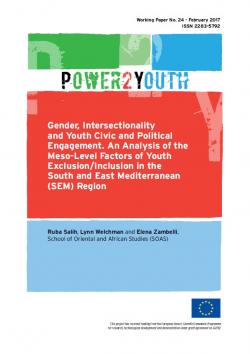Gender, Intersectionality and Youth Civic and Political Engagement. An Analysis of the Meso-Level Factors of Youth Exclusion/Inclusion in the South and East Mediterranean (SEM) Region
This paper contains a discussion of how gender, sexuality, class and race interplay, enabling or obstructing different pathways and modalities of youth civic and political engagement in the countries of the South-Eastern Mediterranean (SEM) region which are part of the Power2Youth project (in alphabetical order: Egypt, Lebanon, Morocco, Palestine, Tunisia, Turkey). It is based on the key research findings contained in the meso-level country papers prepared by Power2Youth partners. The first section undertakes an overview of how gender analysis interrogates the binary of inclusion/exclusion and the ensuing liberalism-informed notions of the public sphere, civil society and agency. Based on such scholarship and insights, the second section discusses findings from WP3 country papers that enable a discussion of how gender, generation, sexuality, class and race interplay in shaping patterns of youth dis/engagement from politics, and states’ approaches to the containment of youth quests for socioeconomic and/or political change. The third and last section discusses how WP3 papers operationalized intersectionality, highlighting strategies that researchers used to address the challenges of sample inclusiveness in the face of youth subjective and socially situated experience of the interlocking structures of power that shape the contexts in which youth live.
-
Details
Roma, IAI, February 2017, 31 p. -
Issue
24
Introduction
1. Problematizing the Inclusion/Exclusion Framework. An Intersectional Approach
1.1 Gendering the Public/Private and Secular/Religious Divides
1.2 Politics Outside of the Liberal Public/Political Sphere
2. Discussion of Main WP3 Findings
2.1 Who Excludes Whom? Gendering the “Public” Sphere
2.2 Youth Subjectification and Agency: The Interplay of Gender, Class and Sexuality
2.3 Gendered, Sexualized and Class-Based State Disciplining Techniques
2.4 Formal, Substantive or Transformative (Gender) Equality? Reforms, Authoritarianism and Arbitrariness
2.5 Depoliticization, or Different Forms of Engagement?
2.6 What Issues Are Youth Issues? Occupation, Political Repression and the Rejection of the “Youth” Label
3. Methodology: The Challenges of Putting Intersectionality to Work
References
Topic
Tag
Related content
-
Ricerca08/10/2014
POWER2YOUTH - Freedom, dignity and justice
leggi tutto



